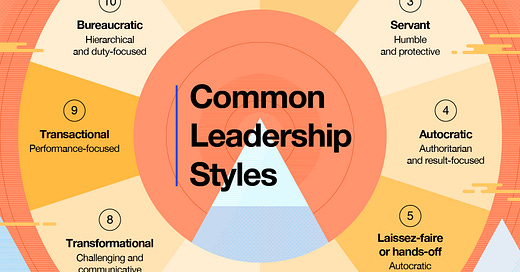ministry monday: leadership
Leadership is a difficult concept to truly define. I think it’s something most of us just know when we see it, and know when we don’t see it. We’re not quite sure what we are seeing or not seeing but we can tell when leadership is lacking.
Leadership is an essential skill to possess as a pastor. I am not winning any awards for coming up with that insight. We all know that. But there are so many ways of leading that sometimes a pastor could be leading and a church not know it. The church has an idea of what a leader looks like and the pastor may not lead like that image.
The following chart demonstrates the range of leadership styles.
As you can see there are 10 styles of leadership, at least that Indeed.com recognizes. But this is a pretty good start.
Because my formative time in ministry was spent in New Hampshire, that informed my leadership style. In New Hampshire, as in most of New England, direct democracy is highly valued. The town meeting is still a thing. So my church, like New Englanders are wont to do, put the “congregational” into congregational polity. I couldn’t just say, hey let’s do this, I had to build consensus. And I think this turned me into a Democratic leader. I lead by gathering support and building consensus because after my experience in New England, I am terrified to do otherwise.
So I’m not going to move terribly fast and I am going to rely on input from others before determining a direction together. But not all churches need or want this type of leadership. That might not be what leadership looks like to them. It might look more like style 2, the Visionary, who charts the course and paints the story and invites people to follow him or her into an awesome future. It might look more like style 3, the Servant-Leader, because that’s how many Christians envision Christ-like leadership. It might, in the mind of my seminary leadership professor, style 8, a style more about transforming your followers in order to accomplish the goals.
So it occurred to me in a conversation with my ministry coach that I might be leading but my church may not realize it because they are looking for something else. So it would be helpful for everyone involved if I were to figure out what kind of leader my congregation is looking for and ask myself, “Can I lead like that?” Or my congregation might ask, “Can we follow that?” In order to be in proper alignment, this is a conversation every ministry leader needs to have with those they are leading.



